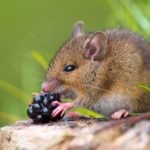 Mice are highly adaptable, so much so that they have a world wide distribution. Found throughout the world, from tropical climates to arctic regions, mice even thrive in temperatures of -10 degrees.
Mice are highly adaptable, so much so that they have a world wide distribution. Found throughout the world, from tropical climates to arctic regions, mice even thrive in temperatures of -10 degrees.
Their highly developed sense of smell enables mice to detect bird seed in feeders and pet food in dishes. This heightened sense of smell causes pet owners to be more prone to rodent issues than non-pet owners.
If a pet owner is also a gardener with “self seeding” flowers, raising mice in addition to pets and flowers is almost unavoidable. If the yard is also home to any nut producing trees, like pecan, walnut or oak, your odds of hosting a family of mice are high.
In order to minimize issues with mice, don’t leave seed in bird feeders or pet food outside after dark. Other worthwhile endeavors toward rodent control include reduction of possible harborage areas outside such as overgrown shrubs, leaf piles or other debris.
Exclusion to prevent mice getting into the home can be difficult since a mouse needs only ¼ of an inch for access. Replacing weather stripping and thresholds as needed, use of copper mesh to fill small gaps around pipes and utility lines and taking proper steps to eliminate larger accesses will help minimize rodents’ access into the home.
If you should experience a problem with mice, or any other pest control issue, please call Mr. Bugg’s Pest Patrol for an evaluation.

